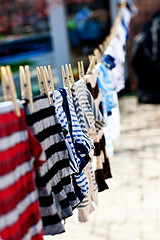Your Checklist for an Eco-Friendly Laundry Room
 When you head to your laundry room, you may think you’re just doing the wash. In reality, though, the home laundry room is much more ... a place where you can make a positive difference to the environment. Your laundry can become more environmentally friendly based on the amount of energy and water you consume and the types of products you use to get your clothes clean. Here’s a suggested list of "green" equpiment and items to stock your laundry with.
When you head to your laundry room, you may think you’re just doing the wash. In reality, though, the home laundry room is much more ... a place where you can make a positive difference to the environment. Your laundry can become more environmentally friendly based on the amount of energy and water you consume and the types of products you use to get your clothes clean. Here’s a suggested list of "green" equpiment and items to stock your laundry with.
Washing Machine
If you plan to purchase a new washing machine, look for one that is labeled by the Energy Star program. An energy-efficient washer will use up to 50 percent less power and water. (Make sure to recycle your old machine when you buy a replacement.) Whether you are working with a brand new washer or an older model, try to run only full loads. Set the water temperature as low as possible, depending on the type of fabric and the degree of soil.
Dryer
The Energy Star program currently does not label dryers because most of the brands on the market use similar amounts of energy. Even gas dryers are comparable in energy consumption to electric, although depending on natural gas prices in your area, they may be less expensive to run. Still, a dryer with a moisture sensor is preferable because it will conserve energy by shutting off as soon as your clothes are dry. Install a rigid dryer vent, which will not collapse and raise energy consumption due to decreased venting action. Clean the vent regularly for efficient operation – you can save the lint for ingenious repurposing projects.
Drying Line or Rack
Ideally, this item will not actually be in your laundry room, but rather outside. If you live in a climate that permits you to line dry in the fresh air at least part of the year, you will end up with wonderful-smelling laundry, while saving both a great deal of energy and wear and tear on your clothes. The next best thing is a rack for drying indoors, perhaps a space-saving wall-mounted or folding type. Hang with wooden clothespins, of course.
Basin
A small sink or basin is handy for a number of purposes. Presoak and treat stained garments to reduce the amount of time and energy required to get them clean in the washer. Help prevent fading and extend the life of your clothes by soaking similar-colored new cottons in a mix of water, white vinegar and salt (1 tablespoon each of vinegar and salt to every cup of water) before machine-washing for the first time. Many home sewing mavens preshrink natural fabrics before cutting; save water by soaking in your trusty basin rather than the washing machine, in water the same temperature at which you plan to wash the finished garment.
Natural Laundry Products
Select laundry detergents and softeners that are biodegradable, based on plants or harmless minerals, rather than petroleum. Choose kinds that work well in energy-sparing cold water. You may wish to save money by mixing your own homemade laundry products. Baking soda and vinegar are two inexpensive natural additions that brighten your wash and also clean your machine. As a natural replacement for chemical-laden dryer sheets, try reusable wool dryer balls, which not only eliminate static but also reduce drying time by 30 percent or more. NOTE: The jury is presently out on the safety of Borax, often recommended as a natural cleaning agent. You may prefer to look for Borax-free laundry products.
Graywater System
A graywater system recycles “used” water for other purposes, such as flushing the toilet or irrigating your garden. In California, no permit is normally required for a laundry-to-landscape system that diverts untreated washing machine water for use in the garden. Your San Francisco plumber is familiar with the official Graywater System Requirements and can install your home graywater system according to code.
Laura Firszt writes for networx.com.
Looking for a Pro? Call us (866) 441-6648

Plumbing Average Costs
Plumbers Experiences

I Built A Concrete Retaining Wall As A Defense Against El Nino

Careful, Professional Tree Service Removes A Huge Norway Maple



